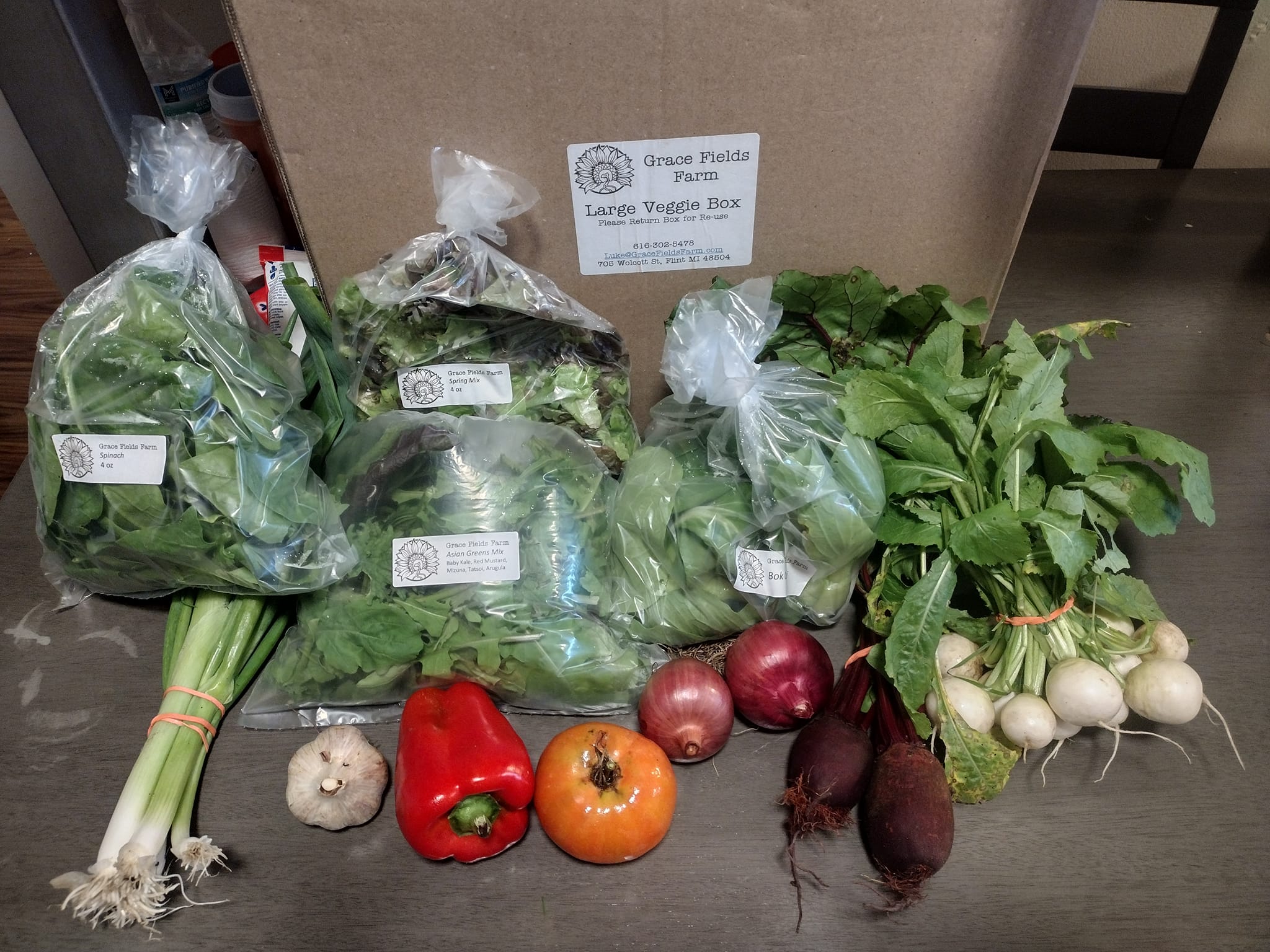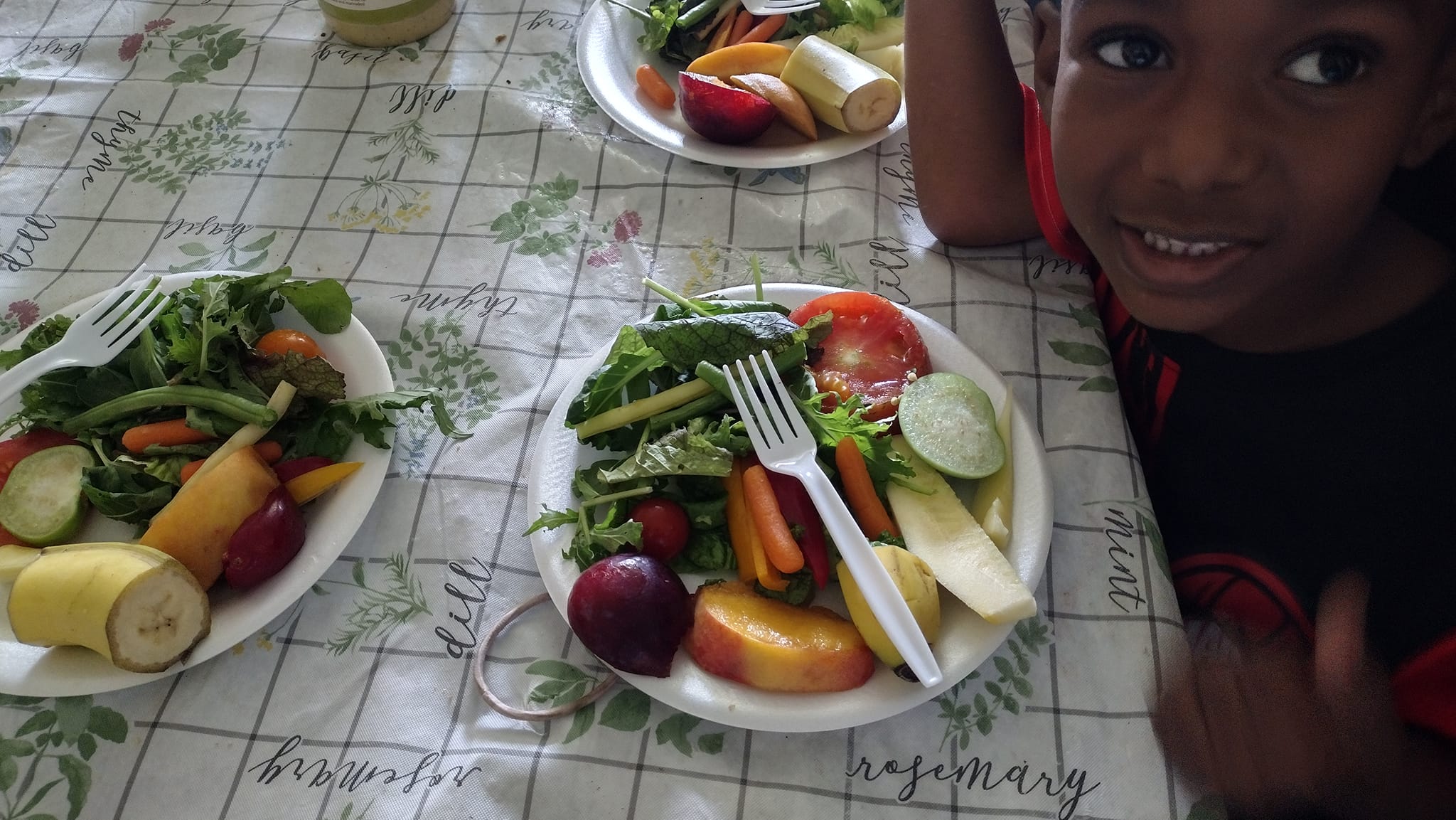Growing healthy eaters
An MSU Extension-supported effort brings local farmers and childcare providers together to support healthy children.

“I never thought of buying local.”
For nearly 30 years, Sherry Loar-Truddell has worked as a childcare provider out of her home in Emmet County. The mother of six fondly recalls the energy of a full house and commonly feeding 12 kids for dinner when her children were younger, as each of them typically had friends over. Loar-Truddell is among a group of over 60 enrolled family daycare home providers that span from the Keweenaw Peninsula to Detroit in an MSU Extension supported effort called Growing Healthy Eaters.
Growing Healthy Eaters is a farm to early care and education (ECE) initiative with the goal of increasing fruit and vegetable consumption among young children enrolled in SNAP-Ed eligible daycare homes. Farm to ECE is an evidence-based approach that includes a set of activities that include purchasing and serving local food, hands-on food and nutrition education, and gardening within early childhood settings. With nearly 60% of children, under the age of six, spending time outside of parental care, early care settings are places that help shape and influence healthy child development and habits.
Farm to ECE is associated with a number of benefits that include increased child willingness to try and eat fruits and vegetables. With 50% of children from age one to five not eating a daily vegetable, farm to ECE offers an engaging and exploratory approach to food, all while supporting learning goals and child development. Through farm to ECE, children experience activities such as taste testing fresh, seasonal food; getting involved in age-appropriate cooking and food preparation; and helping plant, maintain and harvest vegetables from a garden.
Farm to ECE also supports local farmers by serving as a market opportunity. Unlike larger institutions such as schools or hospitals, childcare sites can be attractive buyers that do not require too much advanced planning on the growers end because of smaller, yet consistent food needs.
With support provided by MSU Extension and funds granted through SNAP-Ed and the Allen Foundation, Inc., recruited and enrolled daycare home providers in Growing Healthy Eaters receive a variety of support and assistance with implementing and maintaining farm to ECE.

Support includes:
- 1:1 coaching from a local MSU Extension community nutrition instructor on assistance making and tracking goals related to enhancing child nutrition through farm to ECE.
- A match to a local farmer for a subsidized or no-cost community supported agriculture (CSA) seasonal produce box to be used in snacks or meals.
- Access to free virtual professional development opportunities focused on building practical farm to ECE knowledge.
- Monetary support to purchase one-time small kitchen equipment and/or garden supplies.
- Access to a private Facebook group where enrolled providers receive information, share experiences, questions and successes.
From her home, Loar-Truddell provides childcare primarily for children three years and under and describes participating in Growing Healthy Eaters as “the best educational program I’ve ever done as a childcare provider over the past 30 years.”
Through coaching and support provided, she started to integrate food into learning opportunities.
“I used food to help with colors, this is something I hadn’t done before," she said. "We also brought food into our reading time. I had thought of these as two separate things, but this helped bring the two together."
When it comes to trying new food and preparation techniques, Loar-Truddell admits that she “used to steam everything,” and she has been able to try different flavors and several vegetables with the children in her care. Loar-Truddell was matched with Kafui Okai Adjei, a farmer originally from Ghana, known by his nickname “KK.”
Loar-Truddel and other nearby participating daycare providers got to know KK by picking up their produce from either the Petoskey or Boyne City farmers markets. As a grower, KK has not worked formally with daycare providers before, but loves knowing that his produce was being eaten and enjoyed by young children.
“It raises my heart," he said. "I was so happy when they contacted me. They became friends and were so thrilled to see what I had at the market.” KK learned through feedback from daycare providers that the kids especially loved his rainbow-colored carrots and green beans.
A relationship and continued connection between childcare providers and local farmers is one of the hopes of this initiative. For Sherry Loar-Truddell and KK, they both anticipate maintaining their new friendship. “When you have that 1:1 with someone like KK from start to finish, it’s very wonderful and I plan to continue.”
Loar-Truddell is also among several Growing Healthy Eaters enrolled providers participating in the Child and Adult Care Food Program (CACFP), a federal program that provides reimbursement for nutritious meals and snacks and Michigan’s 10 Cents a Meal program through her CACFP sponsor, the Association for Child Development. It is through these funding streams available to childcare providers that the purchase of local food can be sustained. On-going support from local MSU Extension nutrition instructors is available as providers work towards reaching goals and identify additional areas to enhance child nutrition and physical activity policies, systems and environments.
Dawn Earnesty, PhD, RDN, a senior evaluation specialist at MSU Extension, leads this Growing Healthy Eaters initiative.
“Looking at evaluation results so far, a total of 172 needs and readiness assessments were completed to determine childcare providers needs before they completed 158 nutrition system and environmental changes reaching 951 children," she said. "Improvements were made in child feeding practices, use of fresh/local produce, initiation of a garden, improved menu variety and quality, and use of the garden for nutrition education.”
Jane Sherry, an MSU Extension community nutrition instructor, coaches Loar-Truddell and two other participating providers.

“It’s amazing how much childcare providers do," she said. "It’s a lot of work and I appreciate their effort in buying local and growing food in a garden. These offer such rich experiences for kids at a young age and can help set them up for success in the future. Working with the providers has been a joy.”
As a coach, Sherry provided guidance, access to resources, and encouragement. She loved hearing how the providers were using produce such as roasting vegetables and making spring rolls and soups.
Reflecting on her experience, childcare provider Loar-Trudell shares that participating in Growing Healthy Eaters energized her and contributed to her own positive health changes.
“This has breathed life back into me and I will keep this going," she said. "I wasn’t aware of all of these possibilities. This work has planted seeds in my heart.”
Michigan State University Extension partners with the Michigan Department of Health and Human Services to provide Supplemental Nutrition Assistance Program Education, or SNAP-Ed. SNAP-Ed focuses on good nutrition, stretching food dollars, living physically active lifestyles and engaging partners to build healthier communities. MSU Extension is proud to offer coaching on supporting healthier childcare environments.
MSU Extension is among a group of organizations that work collaboratively to advance farm to early care and education in Michigan. The Michigan Farm to ECE Network collaborates so children ages birth to 5 can grow, choose, and eat nutritious local food in early care and education settings.



 Print
Print Email
Email